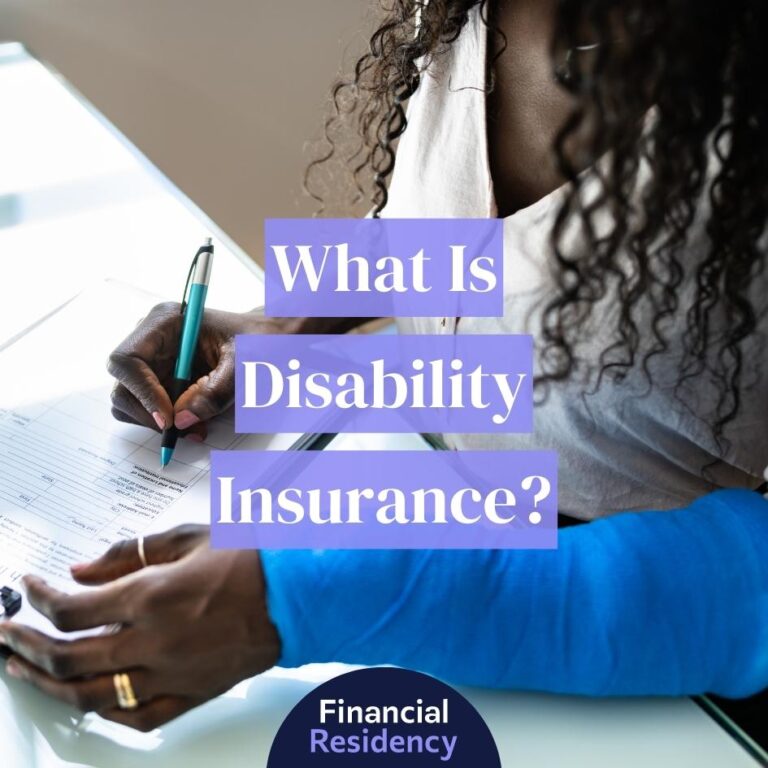The average physician has anywhere from $200,000 to $300,000 of student loan debt. While it might seem morbid to consider, it’s important to understand what happens to your student loan debt if you pass away or become disabled.
In the guide below, we’ll outline the student loan forgiveness process in the unfortunate event of a borrower’s passing and provide a few steps you can take to protect your loved ones from student loan debt.
What Happens to Federal Student Loan Debt When You Die?
Whether or not student loan debt is discharged when someone passes away depends on the type of loan they have.
If you have federal student loans and pass away, your student debt will be eligible for a death discharge from the U.S. Department of Education.
A family member or representative will need to provide proof of death, which can be a copy of the death certificate. to initiate the process. Once your student loan servicer receives proof of the borrower’s death, they’ll process the discharge.
It’s important to note that this discharge only applies to the borrower’s federal student loan debt and not any private student loans they may have.
What Happens to Private Student Loan Debt When You Die?
The death discharge policy is a bit less clear-cut for private loans than it is for federal loans.
Whether or not these debts are forgiven depends on which private lender financed your loans and whether or not you have a cosigner. If you don’t have a cosigner, your student loan balance should be forgiven.
To be safe, you can check with your lender to ask what their loan discharge policy is since they may require you to provide proof of death.
If you took out a loan with a cosigner after November 20, 2018, they will automatically be released thanks to a stipulation in the Economic Growth, Regulatory Relief, and Consumer Protection Act.
If your loan was disbursed before that date, your lender isn’t required to discharge the remaining balance for your cosigner. Once again, you can check with the loan company and review your agreement to see what their cosigner release policy is for older loans.
Are Parent Loans Forgiven When You Die?
As federal student loans, Parent PLUS Loans are forgiven if the student dies or if the parent borrower passes away.
Similar to loans where the student is the primary borrower, the Department of Education requires proof of death in the form of an original death certificate or a copy to discharge the debt.
The policy for private parent loans can vary from one lender to the next. Review your loan terms or contact your lender to get a better understanding of their terms.
Are Student Loans Taxed When Someone Dies?
No. According to a provision in the 2017 Tax Cuts and Jobs Act, any student loan debt that is forgiven due to death will not be taxed by the IRS. This law is in effect through 2025, and Congress could extend it.
The Tax Cuts and Job Act applies to both federal and student loans, protecting all student loan borrowers and their loved ones from a hefty tax bill if someone passes away or becomes disabled.
This legislation also made discharged student debt resulting from disability exempt from federal taxes.
Are Student Loans Forgiven If You’re Disabled?
Some federal student loans are eligible for a Total Disability and Permanent Disability Discharge (TPD). To qualify, you can prove your disability through the U.S. Department of Veterans Affairs (VA), the Social Security Administration (SSA), or through your doctor.
While there isn’t a comprehensive policy for all private student loans, some lenders offer forgiveness for student loans if the borrower becomes permanently disabled.
A handful of disability insurance companies for physicians also offer a student loan rider. The optional benefit can provide extra protection for your student loan payments, covering them for up to 10 to 15 years while you’re totally disabled.
Benefits from this rider are paid directly to your student loan provider, and they usually max out around $2,500 per month. If you have private loans, this is an affordable way to shield yourself and your loved ones from the burden of monthly payments.
How to Protect Your Family from Student Loan Debt
Here are a few ways you can proactively protect your loved ones so they won’t have to worry about student loan repayment.
- Designate a representative: It’s important to explain how student loan discharge works to your parents. Let them know who your loan servicer is so they’ll know where to submit proof of death. If you don’t want to burden your parents or surviving spouse with this task, designate another friend or relative to contact your loan servicer.
- Hold onto federal loans: If you have federal student loans, it could be wise to keep them as opposed to refinancing. In addition to offering low interest rates, forbearance, deferment, and flexible repayment plans, these loans come with more sweeping forgiveness policies.
- Read the fine print: If you have private student loans that were issued prior to November of 2018, review your loan’s discharge policy. If it doesn’t say your cosigner will be off the hook if you pass away, contact your lender to see if they can be released.
- Consider student loan refinancing: If your lender won’t release your cosigner, it may be a smart move to refinance your student loan. You can also streamline your loans with a consolidation loan from the federal government or private lenders like SoFi.
- Use life insurance: Disability and life insurance are key purchases for physicians that ensure your loved ones’ personal finances are secure if you pass away. If your cosigner can’t be released from your current loan but you don’t want to refinance, factor your loan balance into your life insurance policy.
So, Are Student Loans Forgiven if You Die?
The question of whether student loans are forgiven if you die is an important one to consider.
While you can count on the cancellation of your federal student loans if you pass away, not all private student loans have the same provisions.
It’s crucial to understand the terms and conditions of your loans and to communicate with your loan servicers to ensure your loved ones aren’t burdened with debt in the event of your passing.



